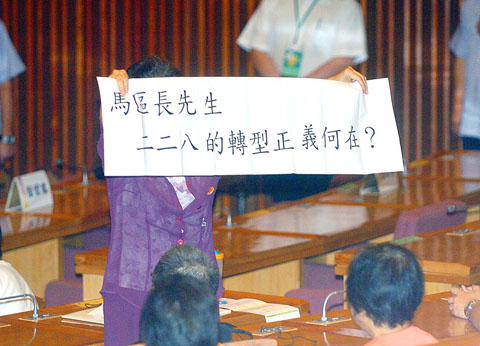President Ma Ying-jeou (馬英九) yesterday promised to push for judicial independence and justice, and to create a harmonious society to prevent violations of human rights like those that occurred during the 228 Incident.
The 228 Incident refers to a massacre in 1947 when Chinese Nationalist Party (KMT) troops suppressed a Taiwanese uprising, leaving tens of thousands dead, missing or imprisoned. The event marked the beginning of the White Terror period in Taiwan, in which thousands more Taiwanese disappeared, were killed or imprisoned.
Ma yesterday vowed to continue promoting transitional justice to ensure that power does not corrupt.

PHOTO: LO PEI-DER, TAIPEI TIMES
“People of different ethnic groups should coexist peacefully and not resort to violence ... On the other hand, the government should not meddle in media coverage and should conduct investigations selectively,” Ma said in a speech to the Taiwanese-Korean Human Rights Forum at the National Library conference hall.
The forum was co-sponsored by the 228 Memorial Foundation and Korea’s May 18 Memorial Foundation. Representatives of human rights organizations, government officials and academics from Taiwan and South Korea were invited to share their experiences and exchange views on human rights and transitional justice.
Ma acknowledged the KMT “political” responsibility for the 228 Incident and promised to continue research into the crackdown.
“Historical mistakes can be forgiven, but should not be forgotten. We should work together to ensure that future generations have a profound understanding of the 228 Incident so no such incidents will occur again,” he said.
Ma’s attendance at the forum, however, met with protest from a family member of a victim of the 228 Incident. Lin Li-tsai (林黎彩) showed a banner reading “Region Chief Ma, where is the transitional justice for the 228 Incident?” as Ma was addressing the forum.
Ma was condemned by the Democratic Progressive Party (DPP) for denigrating the country by referring to it as the “Republic of China, Taiwan region” when receiving foreign guests last month.
Ma ignored the protest and proceeded with his speech. Lin later refused to shake hands with Ma as he greeted the victims of the incident and their family members.
“Why should I shake hands with rubbish? ... Taiwan is a country. Even though the international community does not recognize us, he was elected with over 7 million votes and should not belittle himself like that,” she said.
Legislative Speaker Wang Jin-pyng (王金平), who also attended the forum, said the legislature had passed the Statute for the Handling of and Compensation for the 228 Incident (二二八事件處理及補償條例) and other laws to compensate victims of political persecutions.
Wang said legislators across party lines would continue efforts to make up for the injustice done to political victims.
Chang Yen-hsien (張炎憲), former president of Academia Historica, said South Korea and other countries had set up reconciliation commissions to redress similar grievances and look into political responsibility.
Chang condemned the KMT for failing to provide detailed explanations of the 228 Incident to the victims’ families and suggested that law experts should determine offenders’ civil and criminal responsibilities.
ADDITIONAL REPORTING BY CNA

Trips for more than 100,000 international and domestic air travelers could be disrupted as China launches a military exercise around Taiwan today, Taiwan’s Civil Aviation Administration (CAA) said yesterday. The exercise could affect nearly 900 flights scheduled to enter the Taipei Flight Information Region (FIR) during the exercise window, it added. A notice issued by the Chinese Civil Aviation Administration showed there would be seven temporary zones around the Taiwan Strait which would be used for live-fire exercises, lasting from 8am to 6pm today. All aircraft are prohibited from entering during exercise, it says. Taipei FIR has 14 international air routes and

Taiwan lacks effective and cost-efficient armaments to intercept rockets, making the planned “T-Dome” interception system necessary, two experts said on Tuesday. The concerns were raised after China’s military fired two waves of rockets during live-fire drills around Taiwan on Tuesday, part of two-day exercises code-named “Justice Mission 2025.” The first wave involved 17 rockets launched at 9am from Pingtan in China’s Fujian Province, according to Lieutenant General Hsieh Jih-sheng (謝日升) of the Office of the Deputy Chief of the General Staff for Intelligence at the Ministry of National Defense. Those rockets landed 70 nautical miles (129.6km) northeast of Keelung without flying over Taiwan,

The Ministry of National Defense (MND) today released images of the military tracking China’s People's Liberation Army (PLA) movements during the latest round of Chinese drills around Taiwan. The PLA began "Justice Mission 2025" drills today, carrying out live-fire drills, simulated strikes on land and maritime targets, and exercises to blockade the nation's main ports. The exercises are to continue tomorrow, with the PLA announcing sea and air space restrictions for five zones around Taiwan for 10 hours starting from 8:30am. The ministry today released images showing a Chinese J-16 fighter jet tracked by a F-16V Block 20 jet and the

City buses in Taipei and New Taipei City, as well as the Taipei MRT, would on Saturday begin accepting QR code payments from five electronic payment providers, the Taipei Department of Transportation said yesterday. The new option would allow passengers to use the “transportation QR code” feature from EasyWallet, iPass Money, iCash Pay, Jkopay or PXPay Plus. Passengers should open their preferred electronic payment app, select the “transportation code” — not the regular payment code — unlock it, and scan the code at ticket readers or gates, General Planning Division Director-General Liu Kuo-chu (劉國著) said. People should move through the